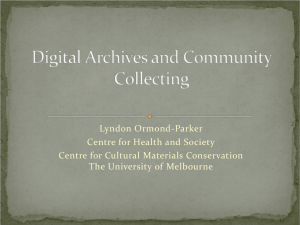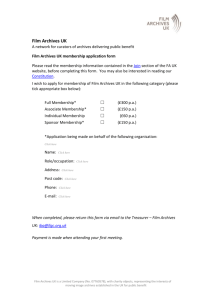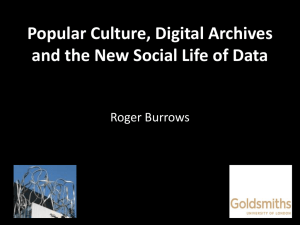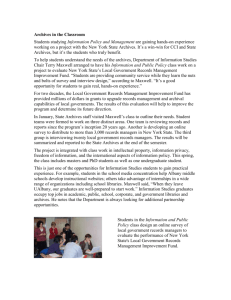Report
advertisement
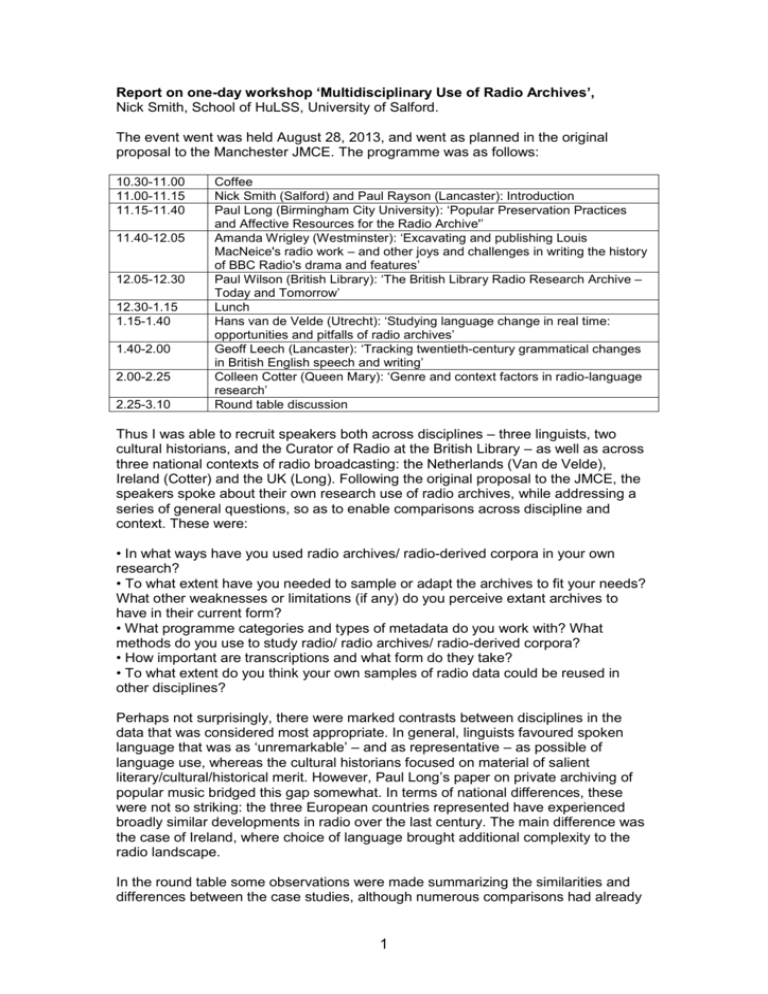
Report on one-day workshop ‘Multidisciplinary Use of Radio Archives’, Nick Smith, School of HuLSS, University of Salford. The event went was held August 28, 2013, and went as planned in the original proposal to the Manchester JMCE. The programme was as follows: 10.30-11.00 11.00-11.15 11.15-11.40 11.40-12.05 12.05-12.30 12.30-1.15 1.15-1.40 1.40-2.00 2.00-2.25 2.25-3.10 Coffee Nick Smith (Salford) and Paul Rayson (Lancaster): Introduction Paul Long (Birmingham City University): ‘Popular Preservation Practices and Affective Resources for the Radio Archive'’ Amanda Wrigley (Westminster): ‘Excavating and publishing Louis MacNeice's radio work – and other joys and challenges in writing the history of BBC Radio's drama and features’ Paul Wilson (British Library): ‘The British Library Radio Research Archive – Today and Tomorrow’ Lunch Hans van de Velde (Utrecht): ‘Studying language change in real time: opportunities and pitfalls of radio archives’ Geoff Leech (Lancaster): ‘Tracking twentieth-century grammatical changes in British English speech and writing’ Colleen Cotter (Queen Mary): ‘Genre and context factors in radio-language research’ Round table discussion Thus I was able to recruit speakers both across disciplines – three linguists, two cultural historians, and the Curator of Radio at the British Library – as well as across three national contexts of radio broadcasting: the Netherlands (Van de Velde), Ireland (Cotter) and the UK (Long). Following the original proposal to the JMCE, the speakers spoke about their own research use of radio archives, while addressing a series of general questions, so as to enable comparisons across discipline and context. These were: • In what ways have you used radio archives/ radio-derived corpora in your own research? • To what extent have you needed to sample or adapt the archives to fit your needs? What other weaknesses or limitations (if any) do you perceive extant archives to have in their current form? • What programme categories and types of metadata do you work with? What methods do you use to study radio/ radio archives/ radio-derived corpora? • How important are transcriptions and what form do they take? • To what extent do you think your own samples of radio data could be reused in other disciplines? Perhaps not surprisingly, there were marked contrasts between disciplines in the data that was considered most appropriate. In general, linguists favoured spoken language that was as ‘unremarkable’ – and as representative – as possible of language use, whereas the cultural historians focused on material of salient literary/cultural/historical merit. However, Paul Long’s paper on private archiving of popular music bridged this gap somewhat. In terms of national differences, these were not so striking: the three European countries represented have experienced broadly similar developments in radio over the last century. The main difference was the case of Ireland, where choice of language brought additional complexity to the radio landscape. In the round table some observations were made summarizing the similarities and differences between the case studies, although numerous comparisons had already 1 been drawn throughout the day. The main focus was shared practical issues, including historical period of most concern in radio archives (i.e. the early/mid-20th century), the patchy nature of archive catalogue information (metadata), the value of creating archives with systematic sampling (corpora), the desirability and specificity of programme transcriptions, and shared problems of copyright clearance and access to archival recordings. Paul Wilson of the British Library spoke of some current and future developments at the BL and the BBC which were intended to alleviate the access issue. However, there was a strong concensus among the participants that academics should be allowed to have more input in informing the selection of material made publicly available. At present the archives are largely ‘supply driven’, particularly in the BBC’s case, and what is supplied is not necessarily what users want. The workshop had a lively, supportive atmosphere, and participants commented on the great value of an opportunity to learn more about approaches to radio in other disciplinary and national contexts. There was discussion of follow-up grant proposals of various kinds (including to the European Union or the International Association of Sound and Audiovisual Archives, to further trans-national comparisons of radio archives). There were also constructive ideas for crowd-sourcing work, mainly by academics, on improving metadata on the archives, which would certainly enhance their usability further still for future research. I would like to express my thanks to the Manchester JMCE for supporting the event. 2



